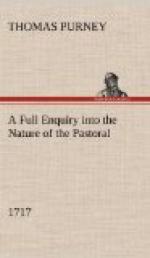* * * * *
But so easy and gentle a kind of Poetry is Pastoral, that ’tis not very pleasant to the busy Part of the World. Men in the midst of Ambition, delight to be rais’d and heated by their Images and Sentiments. Pastoral therefore addresses it self to the Young, the Tender, and particularly those of the SOFT-SEX. The Characters also in Pastoral are of the same Nature; An Innocent Swain; or Tender-Hearted Lass. From such Characters therefore we must draw our Morals, and to such Persons must we direct them; and they should particularly aim at regulating the Lives of Virgins and all young Persons.
* * * * *
What Nature I would have a Moral of, cannot so well be explain’d as by Examples; but I do not remember at present any such Pastoral. You are not widely deficient, Cubbin, I think, in this particular. Your first show’s us, that the best Preservative a young Lass can have against Love and our deluding Sex, is, to be wholly unacquainted therewith. Little Paplet is eager of Listning to Soflin’s Account of Men and Love; but that first set’s her Heart on the Flutter; then she is taken with Soflin’s SWEET-HEART; tho’ all the while she is ignorant of the Cause of her Uneasiness.
The Moral to your second Pastoral, which contain’s Instructions to COQUETTS, warning them not to take pleasure in giving Pain, is, I think, not worst than this.
But the Moral to your Third (call’d the Bashful Swain), methinks, is not so good. It is also directed to the COQUETTS; and instruct’s ’em not to give a Lover any Hopes, whom they do not intend to make happy. If the young Lass there, had jilted Cuddlett, she had mist of her good Fortune; and her Unwillingness to encrease the Number of her Admirers, is the Cause of her Happiness. But, I know not how, this like’s me not so well as the other Three; or, perhaps it is not produced so naturally by the Fable, and that may prevent it’s pleasing.
SECT. 2.
How to form the most regular kind of Moral.
If a Writer’s only Aim was the preserving Poetical Justice in his Moral, he would have nothing to do but to show a Person defective in some slight Particular, and from thence Unhappy; but as a Poet always reaches at Perfection, these following Rules are to be observ’d.
The Inadvertency or Fault which the Character commit’s, must be such a Fault as is the natural or probable Consequence of his Temper. And his Misfortune such an one as is the natural or probable Consequence of his Fault. As in Othello: (For how can I instance in Pastoral.) I rather suppose the Moor’s Fault, to be a too rash and ungrounded Jealousy; than that Fault, common to almost all our Tragedies, of marrying without the Parent’s Consent. A rash Jealousy then, is the natural consequence of an open and impetuous Temper; and the Murder of his Wife is a probable Consequence of such a Jealousy, in such a Temper. So that the Hero’s Temper naturally produces his Fault, and his Fault his Misfortunes.




